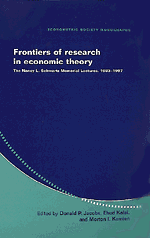Book contents
- Frontmatter
- THE LECTURES
- 1 The Economics of Incentives: An Introductory Account (1983)
- 2 On the Theory of Perfect Competition (1984)
- 3 On the Role of "Dutch Books" in the Theory of Choice Under Risk (1985)
- 4 Rationality and Bounded Rationality (1986)
- 5 On the Mechanics of Economic Development (1987)
- 6 Knightian Uncertainty (1988)
- 7 Evolution, Learning, and Economic Behavior (1989)
- 8 Experimental Economics: Behavioral Lessons for Microeconomic Theory and Policy (1990)
- 9 Habits, Addictions, and Traditions (1991)
- 10 Issues in Social Insurance (1993)
- 11 Negotiation with Private Information: Litigation and Strikes (1994)
- 12 Economic Survival (1995)
- 13 Shirtsleeves to Shirtsleeves: The Economics of Social Mobility (1996)
14 - Anticipated Utility and Dynamic Choice (1997)
Published online by Cambridge University Press: 05 January 2013
- Frontmatter
- THE LECTURES
- 1 The Economics of Incentives: An Introductory Account (1983)
- 2 On the Theory of Perfect Competition (1984)
- 3 On the Role of "Dutch Books" in the Theory of Choice Under Risk (1985)
- 4 Rationality and Bounded Rationality (1986)
- 5 On the Mechanics of Economic Development (1987)
- 6 Knightian Uncertainty (1988)
- 7 Evolution, Learning, and Economic Behavior (1989)
- 8 Experimental Economics: Behavioral Lessons for Microeconomic Theory and Policy (1990)
- 9 Habits, Addictions, and Traditions (1991)
- 10 Issues in Social Insurance (1993)
- 11 Negotiation with Private Information: Litigation and Strikes (1994)
- 12 Economic Survival (1995)
- 13 Shirtsleeves to Shirtsleeves: The Economics of Social Mobility (1996)
Summary
Imagine you are about to play a repeated strategic-form game against a randomly selected Stanford MBA student. You may not talk to her before or during the play of the game - interactions are computer-mediated. To the extent that it matters, her exposure to game theory has consisted of two lectures in the autumn quarter of her first year (which prominently featured an informal account of the folk theorem, based on the prisoners' dilemma); subsequently, she has specialized in courses in finance and accounting.
The game is played repeatedly, with a constant termination probability: You play once and learn (to an extent specified below) the outcome of the first round of play. Then a two-digit random number is drawn: If it is 00, the interaction is over; anything else and you play again. Hence after each round there is a 0.01 chance of the interaction ending and a 0.99 chance of it going on for at least one more round.
The stakes per round are on the order of tens of dollars, enough (I hope) so you and she will take the game seriously, but not so large that risk aversion or liquidity constraints play an appreciable role. Your name and hers will be shielded so that reputation effects (outside of this encounter) can be ignored.
- Type
- Chapter
- Information
- Frontiers of Research in Economic TheoryThe Nancy L. Schwartz Memorial Lectures, 1983–1997, pp. 242 - 274Publisher: Cambridge University PressPrint publication year: 1998
- 98
- Cited by

